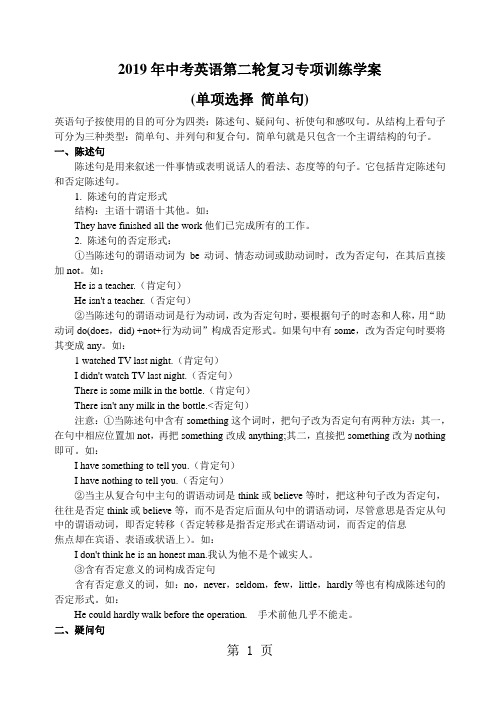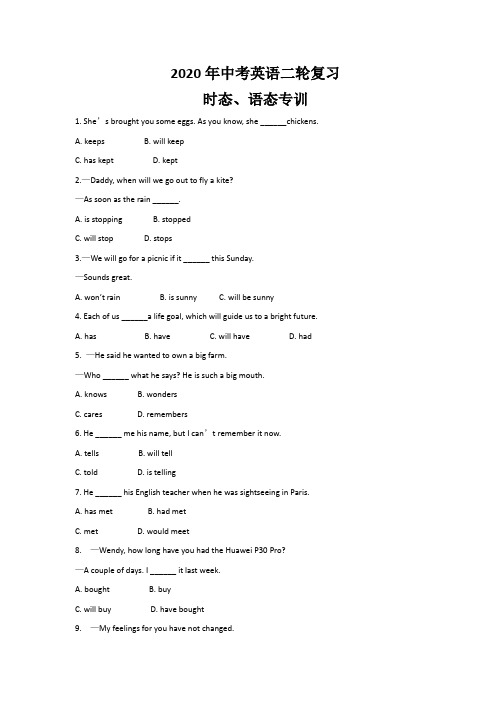中考英语第二轮复习专项训练学案(单项选择动词的时态和语态)
中考英语第二轮复习专项训练学案(单项选择 简单句)-教育文档

2019年中考英语第二轮复习专项训练学案(单项选择简单句)英语句子按使用的目的可分为四类:陈述句、疑问句、祈使句和感叹句。
从结构上看句子可分为三种类型:简单句、并列句和复合句。
简单句就是只包含一个主谓结构的句子。
一、陈述句陈述句是用来叙述一件事情或表明说话人的看法、态度等的句子。
它包括肯定陈述句和否定陈述句。
1. 陈述句的肯定形式结构:主语十谓语十其他。
如:They have finished all the work他们已完成所有的工作。
2. 陈述句的否定形式:①当陈述句的谓语动词为be动词、情态动词或助动词时,改为否定句,在其后直接加not。
如:He is a teacher.(肯定句)He isn't a teacher.(否定句)②当陈述句的谓语动词是行为动词,改为否定句时,要根据句子的时态和人称,用“助动词do(does,did) +not+行为动词”构成否定形式。
如果句中有some,改为否定句时要将其变成any。
如:1 watched TV last night.(肯定句)I didn't watch TV last night.(否定句)There is some milk in the bottle.(肯定句)There isn't any milk in the bottle.<否定句)注意:①当陈述句中含有something这个词时,把句子改为否定句有两种方法:其一,在句中相应位置加not,再把something改成anything;其二,直接把something改为nothing 即可。
如:I have something to tell you.(肯定句)I have nothing to tell you.(否定句)②当主从复合句中主句的谓语动词是think或believe等时,把这种句子改为否定句,往往是否定think或believe等,而不是否定后面从句中的谓语动词,尽管意思是否定从句中的谓语动词,即否定转移(否定转移是指否定形式在谓语动词,而否定的信息焦点却在宾语、表语或状语上)。
专题09+动词的时态和语态【复习课件】-2023年中考英语二轮复习讲练测

• ★用法
用法
例句
Millions of people visit the Great 1. 表示现在经常性或习惯性的动
Wall every year.每年有数百万人参 作或存在的状态。
观长城。
Our teacher told us that light travels 2. 表示客观真理、科学事实及俗
come/go
be here/ there
finish die
be over be dead
marry join
be
be
married in
• 【易混辨析】(1)一般过去时和现在完成时
• 一般过去时:表示过去发生的动作或状态,与现在无关;现在 完成时:表示过去发生的某一动作对现在造成的影响或结果,强调 现在的情况。
一
般 构成:①will/shall+动词原形 ②am/is/are going to+动词原形
将 来
时间标志词:tomorrow, the day after tomorrow, next week/
时 month/year, in+一段时间(如:in two days), in the future等
much faster than sound.我们的老 语。
师告诉过我们光比声音传播得快。
用法
例句
3. 在when, as soon as, before等引 Turn off the lights before you leave
导的时间状语从句和if, unless等 home.出门前记得关灯。
2. 表示过去的习惯性动作或经常 when she was in the primary
2025年中考英语外研版二轮复习语法专项课件:动词的时态

A. came
B. were coming
过去进行时的用法
形式
用法
例句
过去某一时刻或某一段时间内正在
进行的动作或状态 was/were
+ 用过去进行时表示现在,主要为了
现在分词 oing at nine last night? -I was watching TV at that time.
表示过去未能实现的希望或愿望
I had hoped to see you,but there was no time at that time.
时间状语:hardly…when…,no sooner…than…,by the time of last year,by the end of last+时间段,before引导的从句,when引导的从句
A. set
B. sets
C. is setting
D. was setting
3. (2024·江西中考)-Oh hi, I’m looking for a pair of shoes.
-Well, you D to the right place.We have a lot of shoes in our shop.
I was wondering if you can give me a lift.
时间状语:at that time,at this time yesterday,at ten yesterday,just then,yesterday morning等
一般将来时
形式
用法
例句
将来某个时间将要发生的动作
吗?——稍等,她正在厨房做饭。根据语境,打电话时珍妮正在厨房做饭,应该
用现在进行时be doing结构。
中考英语二轮复习课时方案时态、语态无答案牛津版

江苏省东台市头灶镇中学中考英语二轮复习课时方案时态、语态(无答案)牛津版专题内容第七课时(总第 41 课时):复习目标:1、了解各种时态的概念及用法。
2、了解并掌握被动语态的构成及其用法。
3、掌握主动语态和被动语态的转换。
导学活动(以达成复习目标作为贯穿全课活动的一根“红线”,从助你补缺、给你定标、请你点击、引你运用、为你指点、推你提升等6个环节去设计整个教学过程):复习研讨:Task1: 复习各种时态的概念及用法1,一般现在时:用法①表示经常性或习惯性的动作或存在的状态。
eg:I often go to school by bus .② 表示客观事实或普遍真理。
eg:1,The earth is round. 2,Light travels faster than sound .③当主句为一般将来时的时候,在以if,as soon as ,until,when 等引导的时间,条件状语从句中用一般现在时表示将来。
eg: When I grow up , I will go to America .时间状语:always, usually, often, sometimes, every week (day, year, month…), once a week, etc.基本结构:①be动词;②行为动词【中考链接】(2011 北京)1,( )I will send you an e-m ail as soon as I in Canada.A arriveB arrivedC am arrivingD will arrive2,一般过去时:用法① 表示过去某时间发生的动作或存在的状态。
We visited a farm last Sunday .② 表示过去的习惯或经常发生的动作。
(过去常常做某事也可以用used to do sth 来表示)When I was in the countryside ,I used to swim in the river .时间状语:ago, yes terday, the day before yesterday, last week(year, night, month…), in 1989, just now, at the age of 5, one day, long long ago, once upon a time, etc.基本结构:谓语动词用过去式【中考链接】(2009 苏州)1,( )--Have you read a book called Jane Eyer ?---Who it ?A,writes B has written C was writing D wrote3,一般将来时用法① 表示将来发生的动作或存在的状态。
2020年中考英语二轮复习 动词专训--时态、语态

2020年中考英语二轮复习时态、语态专训1. She’s brought you some eggs. As you know, she ______chickens.A. keepsB. will keepC. has keptD. kept2.—Daddy, when will we go out to fly a kite?—As soon as the rain ______.A. is stoppingB. stoppedC. will stopD. stops3.—We will go for a picnic if it ______ this Sunday.—Sounds great.A. won’t rainB. is sunnyC. will be sunny4. Each of us ______a life goal, which will guide us to a bright future.A. hasB. haveC. will haveD. had5. —He said he wanted to own a big farm.—Who ______ what he says? He is such a big mouth.A. knowsB. wondersC. caresD. remembers6. He ______ me his name, but I can’t remember it now.A. tellsB. will tellC. toldD. is telling7. He ______ his English teacher when he was sightseeing in Paris.A. has metB. had metC. metD. would meet8. —Wendy, how long have you had the Huawei P30 Pro?—A couple of days. I ______ it last week.A. boughtB. buyC. will buyD. have bought9. —My feelings for you have not changed.—But you have changed. You are not as you _____.A. areB. wereC. will beD. have been10. David is a tennis player. He_____to play tennis when he was six years old.A. beginsB. beginC. beganD. has begun11. —Tom, what’s your dad doing?—He ______ my bike.A. repairsB. will repairC. has repairedD. is repairing12. It ______. Please take an umbrella with you, Annie.A. rainsB. is rainingC. rainedD. was raining13. —I can’t find Sarah. Where is she?—She ______ for tomorrow’s Xingcheng Cup speaking competition at home.A. preparesB. will prepareC. is preparing14. —Hurry up!—One moment. I ______my e-mail and then I’m ready to go.A. readB. am readingC. was readingD. have read15. —What is your mother doing, Linda?—She ______ dinner in the kitchen now.A. is cookingB. was cookingC. cookD. cooking16. Peter with his classmates ______ for the bus when the earthquake happened.A. is waitingB. was waitingC. are waitingD. were waiting17. Sorry, I didn’t see you, because I ______ a picture.A. drawB. drewC. was drawingD. have drawn18. While the lights ______ to red, a car suddenly appeared round the corner.A. changeB. have changedC. were changingD. will change19. —I went to see you yesterday evening. But you weren’t in. Where were you then? —I ______a walk by the lake with my father.A. was havingB. am havingC. have had20. Amon ______ his ship in a big storm when a giant fish came out of the sea.A. will sailB. is sailingC. was sailingD. has sailed21. If you want to visit the Palace Museum, I______ tickets for you tomorrow.A. will bookB. bookedC. have bookedD. was booking22. —I’ve never seen Mr. Taylor before.—Don’t worry. I ______ him to you before the meeting.A. will introduceB. introducedC. have introducedD. had introduced23. —What is your plan for next weekend, Lingling?—I ______ volunteer work in the museum.A. was doingB. didC. have doneD. am going to do24. Next week, each student in the class ______ a small gift from their teachers.A. receivesB. receivedC. will receiveD. have received25. —You’d better take an umbrella. The weather report says it ______ in the afternoon. —Thank you. I will put one in my bag.A. will rainB. rainsC. is raining26. —It’s ten years since we came here.—How time flies! We ______in China for so long.A. workB. workedC. will workD. have worked27. Our school life ______ a lot since 2017. We have more activities now.A. changesB. changedC. will changeD. has changed28. —Look! My mother _____a new dress for me.—Wow, it looks very nice on you.A. is makingB. has madeC. will make29. My father _____ in a panda protection center for 10 years, so he knows a lot about pandas.A. was workingB. is workingC. has workedD. will work30. Melting ice (融冰) can cause sea levels to rise. Since 1993, sea levels _____ at a speed of 3.2 cm every 10 years.A. roseB. have risenC. rise31. —Where is Catherine? I haven’t seen her for days.—She ______Wuhan. She’ll be back next week.A. has gone toB. has been toC. have gone toD. have been to32. —Where are the teachers now?—In the meeting room. They ______ the meeting for 10 minutes.A. have begunB. have been onC. have hadD. have been held33. —Your new bike is so nice! When did you buy it?—In July. I ______ it for two weeks.A. hadB. have hadC. have boughtD. bought34. —Why won’t we play basketball with Class 4 this afternoon?—Because they ______ Longzhong for a study trip.A. have gone toB. have been toC. had gone toD. had been to35. I ate some fruit, which I ______since I was a child, and the vegetables from my garden.A. have enjoyedB. enjoyedC. enjoyD. had enjoyed36. The villagers expect that the building of the bridge ______before the rainy season comes.A. is completedB. was completedC. will be completedD. has been completed37. My advice on how to save paper ______ by my class last Monday.A. acceptsB. acceptedC. was acceptedD. is accepted38. It is said that one Greater Bay Area university ______ in Guangdong in the future.A. will be builtB. buildC. will buildD. is built39. These cakes ______with chocolate. Have one, please.A. fillB. filledC. are filledD. were filled40. —Perfect photos! Good skills!—Thank you. They ______ through my Huawei mobile phone. In fact, I am not skillful at all.A. tookB. were takenC. will be taken41. The China International Search and Rescue Team has brought help and hope to people in disasters around the world since it ______18 years ago.A. set upB. is set upC. was set upD. will be set up42. Gina went to the doctor’s yesterday and she _____ about the importance of good living habits once more.A. toldB. is toldC. was toldD. has told43. Unluckily, Notre Dame de Paris (巴黎圣母院) ______ this April. We felt so sad for that.A. was burntB. is burntC. has been burnt44. His car ______ five years ago, but it looks quite new.A. buysB. boughtC. is boughtD. was bought45. —The passenger refused to move after taking another one’s seat!—What a shame! He _____ according to the new credit system (诚信体系).A. punishB. punishedC. will punishD. will be punished46. —It’s reported that 31 of the brave young men _____ in a big forest fire in Sichuan.—I don’t know who they are, but I know who they are for.A. were killingB. were killedC. killedD. had killed47. —Tom is always careless with his schoolwork. Could you help him?—No problem! I think he ______to think twice before starting.A. should be toldB. shouldn’t be toldC. should tell48. —Lucy,what have you learnt from this history class?—Paper ______ first ______ about 2,000 years ago in China.A. is; inventedB. was; inventedC. is; inventingD. was; inventing49. In Chinese culture, children born in the Year of the Monkey _______to be smart.A. sayB. saidC. will be saidD. are said50. A baby’s first-month birthday is a special event in China and _______ with a special party.A. celebratesB. is celebratedC. was celebratedD. will celebrate51. —Oh, your room is too dirty, Mike!—Sorry, Mum. It _____ yesterday. I forgot to do it.A. didn’t cleanB. isn’t cleanedC. was cleanedD. wasn’t cleaned参考答案1.A2.D3.B4.A5.C6.C7.C8.A9.B 10.C 11.D 12.B 13.C 14.B 15.A 16.B 17.C 18.C 19.A 20.C 21.A 22.A 23.D 24.C 25.A 26.D 27.D 28.B 29.C 30.B 31.A 32.C 33.B 34.A 35.A 36.C 37. C 38.A 39.C 40.B 41.C 42.C 43.A 44.D 45.D 46.B 47.A 48. B 49. D 50.B 51. D。
初中英语专项训练[原创]新目标初三英语第二轮专题复习学案11语态与主谓一致初中英语
![初中英语专项训练[原创]新目标初三英语第二轮专题复习学案11语态与主谓一致初中英语](https://img.taocdn.com/s3/m/f5f612f7ad02de80d5d84061.png)
初中英语专项训练[原创]新目标初三英语第二轮专题复习学案11语态与主谓一致初中英语 英语组 云幸 被动语态及非谓语动词
一、语态有两种:主动语态和被动语态。主动语态表示主语是动作的执行者,被动语态表示主语是动作的承担者。 考点1.被动语态的构成:助动词be+及物动词的过去分词〔助动词有人称、数和时态的变化〕 1).一样现在时:is /am /are +过去分词 English is spoken by many people. Tea is grown in Southeast China. Are they made in China ? Where is it made ? 2).一样过去时:was / were +过去分词 A lot of flowers were planted along the street last month. Another classroom building was built last year . Some new computers were inverted by scientists. 3).现在进行时:is / am /are + being+过去分词 A new bridge is being built over there . The flowers are being watered by Mr Li now . 4).现在完成时:have / has +been+过去分词 Man-made satellites have been sent up into space by many countries in the world. The work has been finished on time. 5).一样今后时:will /shall/be going to+be+过去分词 The class meeting will be held next Saturday afternoon. The wind will be stopped from blowing the earth away. 6).含有情态动词的被动语态:can /may /must +过去分词 The work can be finished in a month. A large hole must be dug . Books can’t be taken out of the reading room . 考点2、主动语态变被动语态 1).主动结构的宾语变为被动结构的主语。〔宾语是人称代词时,要将宾格变为主格〕 2).主动结构的谓语动词由主动语态变为被动语态。 3).主动结构的主语变为介词by的宾语,组成介词短语,放在被动结构中谓语动词之后,在动作的执行者无须讲明或不必强调时,by短语能够省略。 4).主动语态变为被动语态,时态要保持一致。 We repaired the motor.→The motor was repaired by us. 考点3、被动语态的用法 1).当我们不明白或没有必要讲明动作的执行者是谁时. Those books are written for children. This jacket is made of cotton. 2).动作的承担者是谈话的中心,并用介词by引导动作的执行者。 Food is needed by us all . The room is cleaned by me every day . The book was translated into English by me . This song was written by a friend of mine . The thief was caught by a policeman yesterday evening . The tree was blown down by the strong wind . 3).一些相当于及物动词的短语动词也可用于被动结构中,因此短语动词是一个不可分割的词组,不可丢掉后面的介词或副词。 The child is taken good care of by his grandparents . Why can’t the word be looked up in this dictionary? The lights must be turned off . A short play will be put on at the party . 4).带双宾语〔即直截了当宾语和间接宾语〕的主动语态变为被动语态时,可将其中的一个宾语变为被动句的主语,另一个不变。一样把间接宾语变为被动语态的主语显得自然些,把直截了当宾语留作被动句的宾语。假如把直截了当宾语变为被动句的主语,那么要在间接宾语前加介词〔一样是for或to〕 He gave me a book. →I was given a book (by him ) →A book was given to me (by him). 5).主动句中动词make , let ,have ,see ,hear , feel 等后接不定式作宾语补足语时,动词不定式都需去掉to,即后接不带的动词不定式。但变为被动语态时,后面的不定式须加上to . I often hear her sing .→She is often heard to sing. His parents made him clean his teeth after every meal. →He was made to clean his teeth after every meal by his parents. 6).疑咨询词作主语的句子变为被动语态。 Who spoke English in the next room a moment ago ? →By whom was English spoken in the next room a moment ago ? Or: Who was English spoken by in the next room a moment ago? 7)有些动词的主动语态表被动含义。 Great changes have taken place in our country since 1979. This kind of car sells well . What happened yesterday ? The shop opens at seven . Young trees need watering well . The window wants repairing. 8)need , require , want当〝需要〞讲时,后加动名词,用主动形式表示被动意义,也可用动词不定式表示被动意义。 This desk needs repairing/ to be repaired . 9)有些被动语态结构成了适应用法。 It is said that…据讲…… It is (was) reported that…据报道…… It is well-known that…众所周知…… 二、非谓语动词 非谓语动词也叫动词的非限定形式,包括现在分词、动名词、过去分词和不定式,它们不能独立充当谓语动词,而是与一定的助动词结合构成进行时、完成时、被动语态,或在句子中担任主语、表语、宾语、补语、状语等,在形式上不受主语的人称和数的制约。 考点1、动名词:动名词是由动词+ -ing构成的,其作用相当于名词,可用来作主语、宾语。 Taking a walk after supper is good for your health . Betty likes reading books very much . 考点2、动词不定式:动词不定式没有人称和数的变化,在句子中不能做谓语。动词不定式具有名词、形容词和副词的特点,在句子中能够作主语、宾语、表语、定语和状语,它还具有动词的特点,能够有自己的宾语和状语。它的形式是to+动词原形,否定式为not to+动词原形。 (1)作主语:动词不定式作主语时,常用it作形式主语〔it无词义〕,而将动词不定式放在后面,其形式为:It+be+形容词+〔for sb.〕+ 动词不定式 To learn a foreign language is important now. →It is important to learn a foreign language. It’s necessary for the students to do eye exercises twice a day. It’s too heavy for the boy to carry the box. . It takes him a quarter to cut the hair . (2)作宾语和宾语补足语 ①动词不定式一样不作介词宾语,常作及物动词的宾语,这些动词有want,begin ,start , like ,forget ,ask ,learn, decide , wish等 The boy wants to go to school. He began to learn French three years ago . ②动词不定式在句中作宾语补足语用得专门广泛,如: He asked me to help him. Tell him not to be late . My parents tell me to study English hard . I would like you to meet my English teacher .
- 1、下载文档前请自行甄别文档内容的完整性,平台不提供额外的编辑、内容补充、找答案等附加服务。
- 2、"仅部分预览"的文档,不可在线预览部分如存在完整性等问题,可反馈申请退款(可完整预览的文档不适用该条件!)。
- 3、如文档侵犯您的权益,请联系客服反馈,我们会尽快为您处理(人工客服工作时间:9:00-18:30)。
中考英语第二轮复习专项训练学案(单项选择动词的时态和语态) 年中考英语第二轮复习专项训练学案 (单项选择 动词的时态和语态) 动词的时态 动词主要表示动作、状态和性质,而动作和状态的发生有具体的时间和表现方式,这就是英语中动词的时态。英语中动词的时态由动词的五种不同形式来表示。英语动词的五种基本形式为:动词原形、第三人称单数、现在分词、过去式和过去分词。 形式 构成 例词
动词原形 不带to的动词不定式形式,也就是词典中一般给出的形式 be, have, do, learn
第三人称单数形式 一般在动词原形后加-s run- runs like- likes 以-ch,-sh,-s,-o,-x结尾的动词后加es pass- passes go-goes teach-teaches wash- washes 以“辅音字母+y”结尾的动词,先将y变i再加-es;以“元音字母+y”结尾的动词直接加-s
study- studies try- tries
stay- stays play- plays
现在分词 一般在动词后加-ing listen- listening speak- speaking 以不发音的e结尾的动词,去掉e再加-ing live-living write- writing
以重读闭音节结尾的词,末尾只有一个辅音字母,双写该辅音字母后再加-ing sit- sitting begin- beginning
run-running swim- swimming
过去式与过去分词(规则变化)
在动词原形后加-ed work- worked ask- asked 以e结尾的动词,直接加-d live- lived 以“辅音字母+y”结尾的动词,先将y变为i再加-ed carry- carried worry- worried
study- studied 以重读闭音节结尾而末尾只有一个辅音字母的,双写此辅音字母后再加-ed stop- stopped plan- planned
不规则动词要熟记教科书后的归纳列表,同时注意以下变化规则。 1. 动词原形、过去式和过去分词完全同形。如:cut(切),hit(打),cast(:扔),hurt(伤害),put(放),let(让),shut(关),cost(花费),set(放),rid(清除) 2. 过去式与过去分词完全同形。如:find found found (找到),pay paid paid(支付),leave left left(离开),lend lent lent (借出),meet met met (遇见),keep kept kept (保持),lose lost lost(丢失),teach taught taught (教),sit sat sat (坐),lead led led (引导),win won won (赢) 3. 动词原形与过去分词同形。如:come came come(来),run ran run(跑),become became become(成为) 4. 动词原形、过去式、过去分词形式完全不同。 如:give gave given(给),drink drank drunk(喝),see saw seen(看见),go went gone(去),know knew known(知道),wear wore worn(穿),speak spoke spoken(说) 5. 过去式和过去分词有两种形式。如:burn(燃烧)burned&burnt; learn(学习)learned&learnt; smell(闻)smelled&smelt, spell(拼写)spelled&spelt; shine(照射)shined&shone;leap(跳)leaped & leapt 此外,还有几个特殊词也需要记住: a. beat的过去式与原形同形:beat(打击)beat (过去式)beaten(过去分词) b. 一些动词有规则变化和不规则变化两种,但含义木同。如:lie lied lied(说谎)和lie lay lain(躺,位于),hang hanged hanged(处绞刑)和hang hung hung(挂,吊) 初中英语中常见的有8种时态,动词时态一直是中考考查的重点内容。要求掌握的主要时态是:一般现在时、一般过去时、一般将来时、现在进行时、过 去进行时和现在完成时,另有过去将来时和过去完成时。 一、一般现在时 1.一般现在时的构成: 由动词原形构成,若主语为第三人称单数,一般在动词原形后加一s或-es。 2. 一般现在时的基本用法: 一般现在时表示一般情况和经常发生的动作。常与every day,every,often,alway,usually等时间状语或表示频率的副词连用。 注意: 1. 表示客观事实或普遍真理时用一般现在时。如: The earth goes around the sun. 地球绕着太阳转。 2. 在if引导的时间或条件状语从句中,用一般现在时表示将来。如: If it rains tomorrow, we won't go to the park. 如果明天下雨,我们就不去公园了。 例题 In Lishui, you can often see many people dance outside together if it ____________in the evening. A. rains B doesn't rain C. will rain D. won't rain 【解析】B if引导的条件状语从句中,用一般现在时表将来,主语是it,根据意思应用否定,故选B项。 二、一般过去时 1. 一般过去时的构成: 由动词的过去式构成。 2. 一般过去时的基本用法: 一般过去时指过去发生的动作或事情。常与yesterday引导的词组、ago引导的词组、last引导的词组和the day before yesterday连用。 注意: 1. 讲故事、对过去经历的回忆、双方都明白的过去事件等一般用过去时,而且经常省略时间状语。 2. 一般过去时与过去进行时的区别 一般过去时和过去进行时都是在过去时间里发生的动作。 一般过去时强调过去某个时候或某段时间曾有过某个(已完成的)动作,过去进行时强调过去某一时间正在进行的动作。 例题 --- Your spoken English is so good. Have you been abroad? --- Yes. I __________in America for three years and now I'm living in Beijing. A. will live B. lived C. have lived D. was living 【解析】B根据答句句意“我在美国住了三年,现在住在北京”。可知是过去住在美国三年,故选B项。 三、一般将来时 1.一般将来时的构成: will/shall+动词原形;be going to+动词原形 2.一般将来时的基本用法: 一般将来时表示将来发生的动作或存在的状态。常与next引导的词组、tomorrow引导的词组和the day after tomorrow连用。 注意:1. 在下面几种情况下只可用will/shall表示将来,而不可用be going to结构: (l)表示有礼貌地询问对方是否愿意或表示客气的邀请或命令时。如: Will you please open the window? 请您打开窗户好吗? (2)表示意愿时。如: We will help him if he asks us. 如果他请求我们的话,我们愿意帮他。 (3)表示单纯的将来,与人的主观愿望和判断无关时。如: In the future, there will be a new school here. 将来这儿要建一所新学校。 2. 动词:go, come. leave, stay, start, begin等,常用进行时表示将来,表示即将发生或安排好要做的事情。如:We are leaving for London soon.我们很快就要动身去伦敦了。She is going there tomorrow.她明天要去那里。 例题 People there ____________a meeting tomorrow. A. will be B. are going to be C. will have D. is going to have 【解析】C句意:那儿的人明天要开会。本句时态用将来时,主语是“people”,复数,动词用“have”,故选C项。 四、现在进行时 1. 现在进行时的构成: 由be动词十动词的现在分词构成。 2. 现在进行时的基本用法: 现在进行时表示正在发生的动作,常与时间状语Now,Look. . ,Listen_一等连用。 注意下列这些动词一般不用于现在进行时态的句子中: (l)表示感觉的动词,如see,hear等。 (2)表示喜欢或厌恶的动词,如like,love,hate等。 (3)表示希望的动词,如want,would like等。 (4)表示状态的动词,如be等。 (5)表示归属的动词,如have筹。 (6)表示思维、知识或理解能力的动词,如know,forget等。
